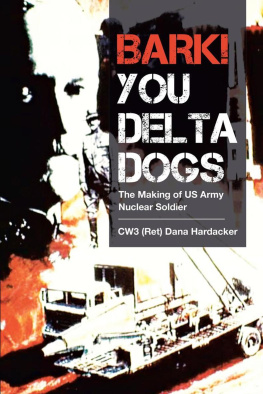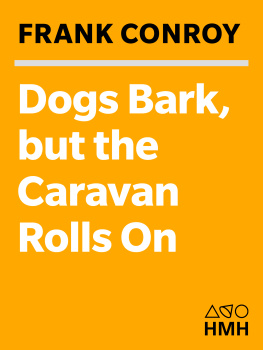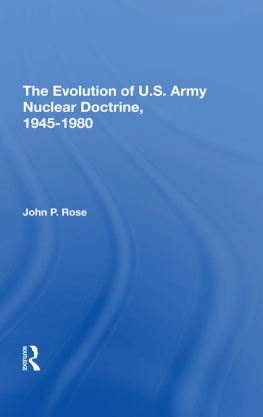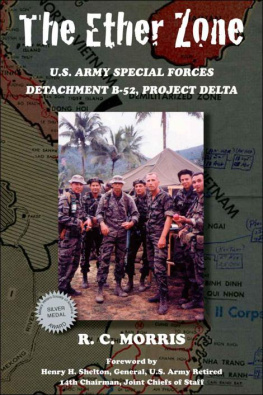Bark! You Delta Dogs
The Making of US Army Nuclear Soldier
CW Ret Dana Hardacker
Copyright 2018 CW Ret Dana Hardacker
All rights reserved
First Edition
Christian Faith Publishing, Inc
Meadville, PA
First originally published by Christian Faith Publishing, Inc 2018
ISBN 978-1-64299-056-0 (Paperback)
ISBN 978-1-64299-057-7 (Digital)
Printed in the United States of America
Introduction
O n December 8, 1987, the President of the United States and the Premier of the Soviet Union signed the Intermediate Nuclear Forces Treaty (INF). This eliminated a tactical class of nuclear weapons from both countries. Pershing II and the Ground Launched Cruise Missile was eliminated from the United States nuclear inventory. The peoples of the United States celebrated this achievement, and the men and women in the Pershing system said this weapon had given peace a chance.
The Pershing II missile system was a political weapon that, in my opinion, was scheduled to be negotiated away. I was one of a group of men who brought Pershing II off the drawing board and fielded the weapon system. Demonstrations across Europedemanding that their government officials stop the deployment of this systemerupted. This and the desire to negotiate a treaty brought changes to the system. More money was poured into the CAS sites and Kaserne throughout Europe which all led to the INF Treaty. Pershing II system has had numerous articles and one book written trying to document the history.
This book, however, is not about the Pershing II system, but the Pershing 1A system. It is my personal journey. It was a time where the units needed junior NCOs to right the system. This memoir does not only give the history of that time, but the affects that it had on the men, women and the families of these units. It was a time when the system had a real army mission and was one of the first strike capabilities that the President had at his disposal. This is about a system that demanded the best of its soldiers and their families. Some families did not make it through the stress of the mission while others came out stronger. But all men and women were part of the Pershing family that gave their all for the protection of the United States and their allies.
This book would not have been possible without the input of CW4 (ret) Richard Wilkinson, CW4 (ret) John Payne, CSM (ret) Tom Noel, MSG (ret) David Dixon, and numerous other people who I spoke with and questioned. All pictures and maps are from public domain.
Chapter 1
ReclassificationPershing 101
N o one I ever knew who entered the army thought they would become a career soldier. It was so with me in 1969 when I entered the U.S. Army as a Private. Most people also believed once they served, they would succeed in a civilian world after they left the service. This was not so for me. After an unsuccessful separation, I re-entered the U.S. Army as part of a group known as Specialist Four and was assigned to Fort Campbell, Kentucky, the home of the 101 st Airborne unit. I still did not see myself as a career soldierjust someone who needed a life reboot.
My Pershing career began in 1973 when I was first stationed at Fort Campbell, Kentucky. I was then reassigned Temporary Duty (TDY) as a recruiter to Presque Isle, Maine. As a member of the 101 st Airborne, I was sent back to where I grew up to entice young men and women to join the Army and the 101 st Airborne specifically. While recruiting, I received a letter from Department of Army (DA) informing me that I would not get promoted in my current military occupational specialty (MOS)supply and chemical weapons specialist. DA advised me of other positions where there was a shortage of capable soldiers, where I could pursue a career track that offered both promotions and reassignments. I realized I needed to change my occupational specialty to have any hope to move forward in my career.
My available MOS positions were in the Pershing Missile field. Because of talks I had had with other soldiers in other assignments, I assumed that everyone in a missile field wore white-top coats and walked around with a clipboard. I also assumed that they never went to the field, that they only worked eight hours days, five days a week. Another assumption was that all the duty stations were either in the Federal Republic of Germany or here in the United States. Having already served one tour in Vietnam, I had no desire to return to Southeast Asia even if the war was over. I never liked the regional weather and food much. I could not wait to check the selection box and send it back to DA.
Three months later, I received my orders assigning me to Battery C Special Training Battalion, Field Artillery School, Fort Sill, Oklahoma. I was to be trained there as a Pershing Missile Assistant Chief of Section (15E40). When I arrived at Fort Sill on Tuesday, May 28, 1974, it was over a hundred degrees in the shade. The grass was brown, and the sun was baking everything. It was a complete environmental change from green, cool and wet New England. Thank God we were in our summer khaki uniforms. The tan, short-sleeved uniforms assisted in our adjusting to the heat. It would have been unbearable if we were still in in our class A green uniforms.
Two NCOs and I could not see anyone waiting to take us to Fort Sill, so we got a cab. When all our gear was in the cab we jumped in. The cab driver left the airport, and one of the NCOs turned to him to ask if he would put on the air conditioning. The cabby said, We are using Oklahoma air conditioning.
The NCO looked at him and said, What is Oklahoma air conditioning?
All four windows down and sixty miles an hour, the cabby answered. He seemed very pleased with himself. As soon as we arrived at the fort, an administrative specialist assigned me and the two NCOs into Charlie Battery, Special Training Battalion. Our barracks was in the 2000 area right next to the stockade.
After arriving at the barracks, I was completely surprised to hear and see the attitude of the NCOs who were already there. Most of the new incoming NCOs I arrived with were used to being in highly motivated units with a huge amount of fighting spirit. However, the typical attitude of NCOs in my barracks was that of men who had been sentenced to life imprisonment. They immediately expressed how much they despised the Pershing Missile System. Most could not tell us why. Their response was, You will soon find out why we hate this system! You will also demand an immediate transfer. They would usually end their complaints by commenting on how much DA had screwed them and everyone sent to the Pershing system. I pondered how and why this negative attitude of the NCOs could exist in a missile unit. I was still nave and believed that I would be receiving my white overcoat and work in an air-conditioned bunker.
A couple of days later, I was provided with a reality check when I stood before the Battery Commander (BC) and was questioned about my beliefs concerning taking human lives with a nuclear weapon. This interview was the first chance for me to get out of the assignment. I was being inducted to the Personal Reliability Program (PRP), and this program was voluntary. If a soldier refused to receive PRP, they would be eliminated from any nuclear assignment including the Pershing Missile system.
PRP governed all the Pershing soldiers qualifications to enter a military occupational specialty (MOS) for nuclear weapons. It laid out the qualifications and requirements for soldiers to remain in a sensitive nuclear position. There were rules for everything. I was told how much I could drink. There was a limit on how many times I could get drunk. If I were caught being drunk in public. then I would be removed from Pershing duty. I was informed of what types of medicine I could take. There was a litany of what crimes or infringements could cause me to be suspended from the program. They questioned my financial status. They probed for weaknesses or vulnerabilities in me that I had never previously considered.










